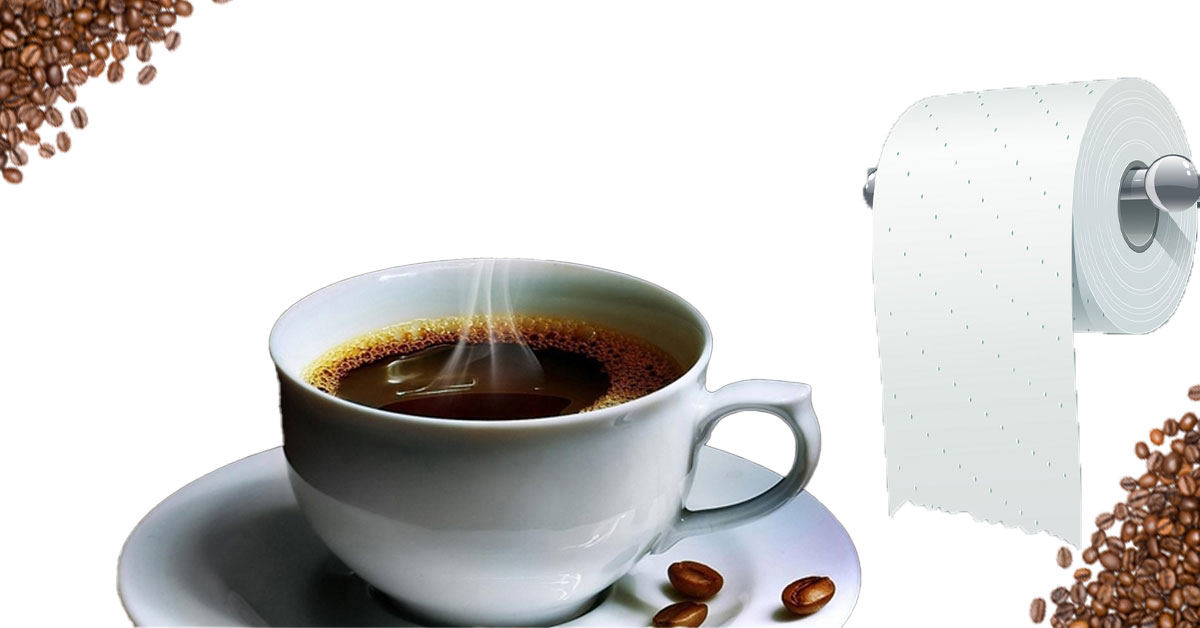If coffee often leads to unwanted bathroom trips, a few adjustments can help. Option for lower-acid or decaf options and consider gradually cutting back on your intake to address the question, How to Stop Coffee From Making You Poop?
This guide aims to help you understand why your beloved beverage might stimulate your digestive system, and provide helpful tips on how to stop coffee from making you poop?
Experiment with having coffee after meals and ensure you stay hydrated. Adding dairy might also ease its impact. If problems persist, seeking advice from a healthcare professional can provide tailored solutions.
Most of us love the comforting aroma and taste of a freshly brewed morning cup of joe, but have you ever wondered why coffee can sometimes make you rush to the restroom? This intriguing and sometimes inconvenient phenomenon is a reality for many coffee lovers.
From the role of chlorogenic acid and caffeine content, to the impact of drinking coffee on an empty stomach, we delve into the intricacies of coffee’s effects on your body.
Whether you enjoy hot coffee, iced coffee, or a fancy French press brew, we’ve got you covered. Let’s explore the fascinating world of coffee and its interaction with our bodies.
Why Can Coffee Make You Go To The Bathroom More Often?
The potent blend of ingredients in coffee, such as chlorogenic acid and caffeine, can significantly impact your digestive tract.
But why does this happen? The explanation lies in how these substances interact with your body, particularly your gastrointestinal tract.
Gastrocolic Reflex
The gastrocolic reflex is a natural physiological reaction that occurs when food enters your stomach, signaling the colon to make room for the incoming food by promoting a bowel movement. The caffeine content in your regular coffee amplifies this reflex, increasing colonic motor activity and leading to more frequent trips to the restroom.
Stimulating Effect of Caffeine and Chlorogenic Acid
Caffeine is a natural stimulant known for its energy-boosting properties. However, it also stimulates muscle contractions in the large intestine, similar to those that occur after eating a meal.
Moreover, the presence of chlorogenic acids in coffee stimulates the production of stomach acid, which may expedite the digestive process, culminating in a quicker urge to evacuate.
Acidity of Coffee
The acidity of coffee, especially black coffee, can cause an increase in gastric acid secretion. This enhanced acidity in the stomach can lead to increased movement in the digestive tract, resulting in a more urgent need to visit the bathroom.
In a nutshell, if you’re a coffee drinker experiencing frequent bowel movements post your morning brew, it’s most likely due to these factors interacting with your digestive system.
How To Stop Coffee From Making You Poop?
Unpleasant side effects of coffee on the digestive system are an issue for many, but there are several ways to mitigate the laxative effect of coffee. Here’s how you can continue enjoying your daily caffeine intake while reducing the frequency of bathroom visits.
Drink Less Coffee
One of the most straightforward solutions is to reduce your coffee consumption. If you’re drinking several cups of coffee a day, try cutting back to just one or two. You might find that your digestive system is less reactive with less coffee.
Switch To Decaf
Decaffeinated coffee contains significantly fewer milligrams of caffeine, which can alleviate its stimulating effects on the digestive tract. Though the taste may slightly differ from regular coffee, decaf could be a great alternative for those who want to enjoy their brew without the urgent bathroom breaks.
Stop Using Milk Or Creamer
For individuals with lactose intolerance, dairy products in coffee can cause digestive issues, including loose stools. Consider skipping milk or creamer, or switch to non-dairy alternatives like almond or oat milk.
Drink Coffee After Your Regular Bathroom Time
Timing is crucial. If you experience bowel movements in the morning, try having your morning cup of coffee afterward. This could help you control coffee’s laxative effect and make your daily routine more comfortable.
Avoid Drinking Coffee On An Empty Stomach
Drinking coffee on an empty stomach can lead to more pronounced effects on the digestive system. Try having breakfast before your morning brew, which could slow down the digestive process and decrease the urgency and frequency of bowel movements.
Go For Low Acid Coffees
Finally, if the acidity of coffee is causing you digestive discomfort, opt for coffees with a low acid content. Cold brew and darker roasts tend to have lower acidity, providing a smoother experience for your stomach.
By employing these strategies, you can still savor your favorite morning brew without its adverse effects on your digestive system.
Stop Being Reliant On Coffee To Poop
While coffee can stimulate the digestive process, becoming reliant on it to facilitate regular bowel movements is not ideal for your overall health. This reliance could lead to discomfort on days when you skip your regular coffee, or an overactive digestive system when you consume too much.
Adopt a Balanced Diet
Maintaining a diet rich in fiber can significantly improve colon activity. Include whole grains, fruits, and vegetables in your meals to keep your digestive tract healthy and regular, without the need for a caffeine-induced boost.
Stay Hydrated
Dehydration can cause constipation and other digestive issues. Ensure you’re drinking plenty of water daily, even if you’re also drinking coffee. Staying well-hydrated can keep your digestive system functioning smoothly.
Consider Alternatives to Coffee
If you’re trying to reduce your caffeine intake, consider other warm beverages like herbal tea or green tea. These drinks can offer similar comforting effects without triggering unwanted digestive responses.
Remember, coffee can be a delightful part of your daily routine, but it shouldn’t be a crutch for maintaining regular bowel movements. Adopting healthy dietary habits and exploring beverage alternatives can help you enjoy your morning cup without becoming too dependent on its laxative effects.
Do They Reduce Diarrhea?
If you’re a coffee enthusiast with a sensitive stomach, low-acid coffees might be a game-changer for you. But does switching to these options help reduce diarrhea or frequent bathroom trips caused by coffee? Let’s find out.
Low Acid Coffees
Low acid coffees are made from beans naturally low in acidity, or they undergo a special roasting process to remove the acidity. Dark roast coffee, cold brew, and certain brands specifically marketed as low-acid, like arabica beans, fall under this category. They retain the robust flavor of coffee while being gentler on the stomach.
Low Acid Coffees and Diarrhea
As the acidity of coffee can stimulate the production of stomach acid and increase the movement in the digestive tract, low acid coffees might indeed reduce the incidence of diarrhea. By lowering the amount of acid that enters your system, you may experience less gastric irritation, which could decrease the urgency and frequency of bowel movements.
However, remember that coffee’s laxative effect isn’t solely attributed to its acidity. Caffeine and other compounds play a role as well, and these are still present in low-acid coffee. Therefore, while switching to low acid coffee may provide relief for some, it might not completely eliminate coffee-induced diarrhea for everyone.
Trying different brewing methods, adjusting your coffee intake, or consulting with a healthcare professional can help you find the best solution for your digestive health while still enjoying your favorite beverage.
Managing Coffee’s Impact on Digestive Health
Navigating the world of coffee can be both a delight and a challenge, especially when dealing with its effects on the digestive system. While it’s clear that coffee can stimulate the gastrocolic reflex and trigger more frequent trips to the bathroom, there are numerous ways to mitigate this effect and still enjoy your favorite brew.
Strategies for a Balanced Brew Experience
Whether it’s adjusting the amount of coffee you consume, switching to decaf or low-acid coffee, avoiding dairy products, or timing your coffee intake better, each strategy can help you keep your digestive health in check. The key is to find a balance that suits your lifestyle and your body.
FAQs ( frequently asked questions)
Got more questions about coffee and its effects on your digestive system? Here are answers to some frequently asked questions.
Can decaf coffee still make you poop?
While decaf coffee has much less caffeine than regular coffee, it still contains small amounts and other compounds like chlorogenic acid that can stimulate the digestive system. Therefore, some people might still experience a laxative effect from decaf.
Does black coffee make you poop more than coffee with milk or cream?
The effects of coffee on bowel movements can vary greatly from person to person. Some people may find that black coffee stimulates their bowels more due to its higher acidity, while others may experience an increase in bowel movements from the dairy or artificial sweeteners added to their coffee, particularly if they have a sensitivity or intolerance.
Does iced coffee make you poop more than hot coffee?
The temperature of your coffee doesn’t directly impact its effect on the digestive system. It’s the caffeine and other compounds in coffee, rather than the temperature, that stimulate bowel movements. Both iced and hot coffee can make you poop, assuming they have similar caffeine content.
Why does coffee make me poop immediately?
Coffee can stimulate muscle contractions in the distal colon, which naturally moves towards the rectum and can lead to a bowel movement. This effect, combined with the stimulation of gastric acid and the amplification of the gastrocolic reflex, can make some people need to poop soon after drinking coffee.
Always remember, while coffee is enjoyed by many around the world, its effects on the body can vary significantly between individuals. If you have concerns about your coffee consumption and its impact on your digestive health, it’s always a good idea to consult with a healthcare professional.

